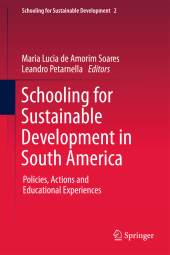 Neuerscheinungen 2013Stand: 2020-01-07 |
Schnellsuche
ISBN/Stichwort/Autor
|
Herderstraße 10
10625 Berlin
Tel.: 030 315 714 16
Fax 030 315 714 14
info@buchspektrum.de |

Maria Lucia de Amorim Soares, Leandro Petarnella
(Beteiligte)
Schooling for Sustainable Development in South America
Policies, Actions and Educational Experiences
Herausgegeben von de Amorim Soares, Maria Lucia; Petarnella, Leandro
2011. 2013. xvi, 236 S. XVI, 236 p. 235 mm
Verlag/Jahr: SPRINGER NETHERLANDS; SPRINGER, BERLIN 2013
ISBN: 9400737386 (9400737386)
Neue ISBN: 978-9400737389 (9789400737389)
Preis und Lieferzeit: Bitte klicken
This book supplies data and analysis on sustainability education projects in South America. Examining the issues from the perspectives of national policy, regional planning and grassroots projects, it will foster scholarly exchange in this vital research area.
This book supplies both empirical evidence and scholarly analysis that exemplify successful innovation in South America in the field of sustainability education. Examining the issues from a three-fold perspective, of national policy, regional planning and grassroots projects in schools and communities, the volume offers a comprehensive overview of the contemporary situation in Brazil, Chile, Bolivia, Argentina and Venezuela. It provides case studies as detailed illustrations of the recipe for success as well as to inform researchers and practitioners of the kinds of obstacles and challenges they might face in seeking to manifest sustainability.
A good deal of the research and scholarly studies in the field of education for sustainability and sustainable development is underpinned by ´Western´ norms and culture. This book draws on that literature, yet also teases out features in the case studies that are particular to the region. South America itself encompasses a rich variety of natural and cultural environments-within individual nations as much as continent-wide. This diversity is a recurring theme in the book.
The volume´s three sections provide first a general survey, enriched with material from studies conducted in a number of different polities. The second section covers developments in Brazil, South America´s largest nation and one that exhibits many of the features of education for sustainability found across the continent. Part three sets out and explores future trends. As with other books in the Schooling for Sustainable Development series, this volume will add impetus to scholarly exchange as well as contributing insights on education policy and curriculum changes across South American communities that exist in an increasingly globalized world.


